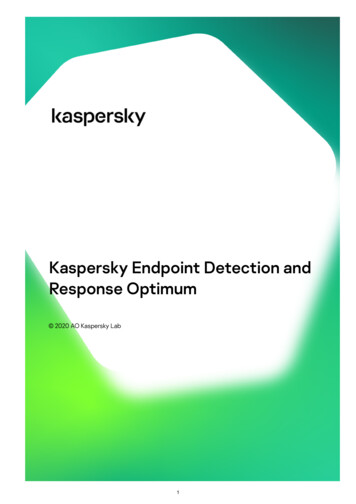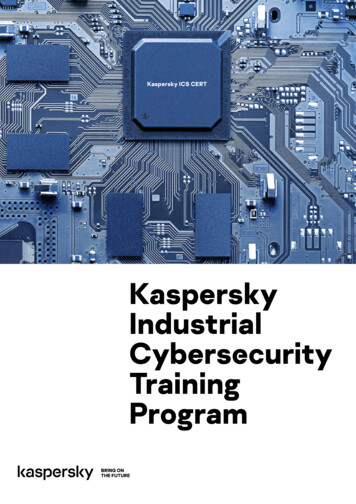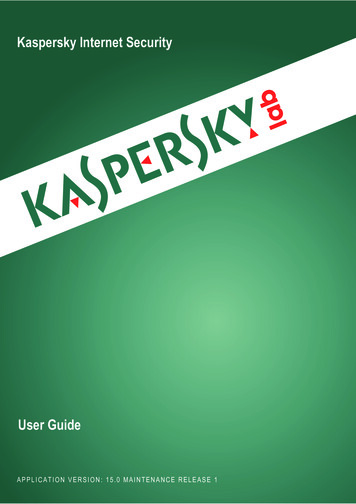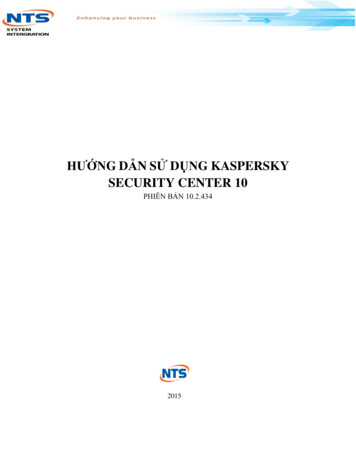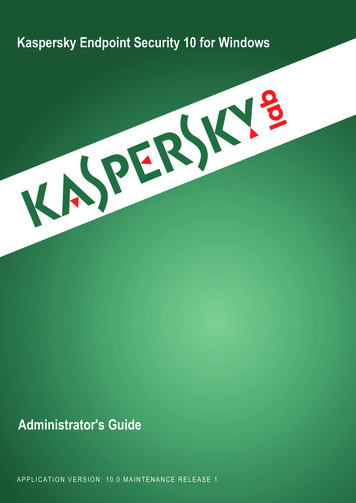
Transcription
Kaspersky Industrial CyberSecurityKaspersky IndustrialCyberSecurity:solution overview 2018www.kaspersky.com/ics#truecybersecurity
Kaspersky IndustrialCyberSecurity:solution overview 2018Attacks on industrialsystems are on the increase1PwC: Global State of InformationSecurity 20152The state of industrial cybersecurity2017, Kaspersky Lab3Allianz Risk Barometer 2018Cyber attacks on industrial control systems are not just on theincrease, but have transitioned from speculative to indisputable1.Three in four industrial companies say they believe they willexperience an ICS cyber attack 2. Business and supply chaininterruption has ranked as the number one risk concern globallyfor the past six years; cyber incident ranked second in 20183.For businesses operating industrial or critical infrastructuresystems, the risks have never been greater. Industrial security hasconsequences that reach far beyond business and reputationalprotection. When it comes to protecting industrial systems fromcyberthreats, there are specific and significant ecological, socialand macro-economic considerations.Operational technology vs. information technologyAs defined by automation standard IEC 62443, an Industrial Control System (ICS) is a collectionof personnel, hardware, and software that can affect or influence the safe, secure, and reliableoperation of an industrial (technological) process.Industrial Control Systems include but are not limited to: Distributed Control Systems (DCSs), Programmable Logic Controllers (PLCs), Remote TerminalUnits (RTUs), Intelligent Electronic Devices (IEDs), Supervisory Control And Data Acquisition(SCADA) and diagnostic systems. Associated internal, human, network, or machine interfaces used to provide control, safety, andmanufacturing operational functionality to continuous, batch, discrete, and other processes.In more high-level terms, any industrial systems infrastructure can be broken down into two domains: Information Technology (IT) – systems required for managing data in the context of business goals Operational Technology (OT) – systems required for managing the physical, industrialprocesses of industrial automation.IT security strategies tend to focus on data protection, and to follow the objectives of the‘C-I-A’ model: Data Confidentiality, Integrity and Availability. However, for most OT systems,cybersecurity is not about ‘data’ but about the continuity of industrial processes. So, in terms ofthe C-I-A model, ‘availability’ is a main focus of security strategies as applied to OT. This is whatdistinguishes industrial cybersecurity needs from those of other systems, meaning that the evenmost effective classical IT cybersecurity solution is inappropriate for use on OT systems, puttingthe availability (and in some cases the integrity) of processes at risk.1
Risks and threatsDespite a growing awareness of the prevalence of cyber-basedattacks on industrial control systems, many IT security modelscontinue to adhere to the outdated belief that physically isolatingsystems (through ‘airgaps’) and ‘security by obscurity’ is enough.It’s not – in the era of Industry 4.0, most non-critical industrialnetworks are accessible via the internet4, whether or not bychoice. Extensive research by Kaspersky Lab ICS CERT, using datafrom the Kaspersky Security Network, indicates that industrialPCs are regularly attacked by the same generic malware thatafflicts business systems (IT), including (but not limited to) wellknown culprits such as trojans, viruses and worms. In the secondhalf of 2017, Kaspersky Lab products across the globe blockedattempted malware attacks on 37.8% of all Kaspersky-protectedcomputers classified as components of industrial infrastructure5.Another rising threat to the ICS is ransomware. The range anddiversity of ransomware escalated massively between 2015 and2017. The emergence of ransomware is highly significant forthe industrial sector – such infections cause high-impact, wideranging damage to critical systems, making the ICS a particularlyattractive potential target – as proven by numerous incidents ofransomware attacks (especially WannaCry and exPetr infections)hitting ICS/SCADA systems during 2017. In the near futureransomware designed to attack industrial systems may have itsown specific agenda – instead of encrypting data, the malwaremay set out to disrupt operations or to block access to a key asset.As well as generic threats, industrial security must contend withICS-specific malware and targeted attacks: Stuxnet, Havex,BlackEnergy, Industroyer, and the recent Triton that targets SafetyInstrumented System – the list is growing rapidly. As the Stuxnetand BlackEnergy attacks have shown, one infected USB driveor single spear-phishing email is all it takes for well-preparedattackers to bridge the air gap and penetrate an isolated network.In addition to malware and targeted attacks, industrialorganizations face other threats and risks targeting people,processes and technology – and underestimating these risks canhave serious consequences. Kaspersky Lab develops solutionsand services to help our customers tackle and manage not onlymalware and targeted attacks but also many other cyber incidentsand risk factors, such as: 4I CS and their online availability 2016,Kaspersky Lab5 hreat Landscape for IndustrialTAutomation Systems for H2 2017,Kaspersky Lab ICS CERTMistakes by SCADA operators or contractors (service providers)Fraudulent actionsCyber sabotageCompliance issuesLack of awareness and hard data for forensic investigation2
The need for specialized industrialcybersecurityOnly cybersecurity vendors who understand the differencesbetween cyber-physical enterprises and data-orientedenterprises can deliver solutions that meet the unique securityneeds of industrial control systems and infrastructure. ForresterResearch advises industrial organizations selecting a securityvendor to “Look for specialized industry expertise.” Forrestergoes on to identify Kaspersky Lab as one of the few vendors withgenuine specialist expertise in this sector.Kaspersky Lab: trustedindustrial cybersecurityproviderA recognized leader in cybersecurity and industrial protection6,Kaspersky Lab is continually researching and developing solutionsthat do more to address constantly evolving threats to industrialand critical infrastructures. From operations management to theICS level and beyond, Kaspersky Lab is playing a leading role inhelping industry, regulators and government agencies globallyto anticipate changes in the threat landscape and to defendagainst attacks.A trusted security provider and partner to leading industrialorganizations who have relied for many years on our anti-malwareprotection, Kaspersky Lab collaborates with well-recognizedindustrial automation vendors and organizations, includingEmerson, SAP, Siemens, Schneider Electric, Industrial InternetConsortium and others, to establish compatibility, specializedprocedures and co-operation frameworks which protect industrialenvironments from existing and emerging threats, includinghighly targeted attacks.Kaspersky Lab has developed a portfolio of specialized solutionsto address specific industrial cybersecurity market needs –Kaspersky Industrial CyberSecurity (KICS). These solutionsprovide effective security from cyberthreats at all ICS layers –including SCADA servers, HMI, engineering workstations, PLCsand industrial network connections – without impactingon operational continuity and the consistency of industrialprocesses.In keeping with Kaspersky Lab’s overall multi-layered securitystrategy, Kaspersky Industrial CyberSecurity delivers a combinationof protection methodologies. Taking a holistic approach toindustrial cybersecurity – from predicting potential attackvectors, through specialized industrial prevention and detectiontechnologies, to responding proactively to a cyber incident –is the ultimate guarantee of your organization’s uninterruptedand safe functioning.6 artner Market Guide for OperationalGTechnology Security, 20173
ArchitecturePredictPreventRespondDetectKaspersky IndustrialCyberSecurity: servicesOur suite of services forms an important part of the KICSportfolio – we provide the full cycle of security services, fromindustrial cybersecurity assessment to incident response.Knowledge (education and intelligence) Trainings: Kaspersky Lab offers training courses designed forcybersecurity experts and OT managers/ICS operators, e.g.during “Advanced Industrial Cybersecurity in Practice” training,participants gain an insight into relevant cyberthreats, theirdevelopmental trends and the most effective methods toprotect against them. Skill-development courses also enablesecurity professionals to further develop their skills in specificareas, including ICS Penetration Testing and Digital Forensics. Awareness Programs: To increase awareness of relevantindustrial cybersecurity issues, as well as fostering the skillsneeded to address and resolve them, Kaspersky Lab offerstraining ‘games’ for security managers and engineers. Forexample, Kaspersky Industrial Protection Simulation (KIPS)simulates real-world cyber attacks on industrial automationsystems, demonstrating the main issues associated withindustrial cybersecurity provision. Intelligence Reporting: Up-to-date threat intelligence reportsare prepared for you by our dedicated ICS Cyber EmergencyResponse Team.4
Expert services Cybersecurity Assessment: For organizations concernedabout the potential operational impact of IT/OT security,Kaspersky Lab provides minimally invasive industrial cyber security assessment. A crucial first step in establishing securityrequirements within the context of operational needs, this canalso provide significant insight into cybersecurity levels, evenwithout further deployment of protection technologies. Solution Integration: If an organization’s industrial controlsystems have a unique architecture or are based on customhardware and software components not widely used inthe industry, Kaspersky Lab can adapt recommendedcybersecurity tools to work with these systems. This serviceincorporates support for unique software and hardwaresystems, including proprietary SCADA, PLCs, and industrialcommunication protocols. Incident Response: In the event of a cybersecurity incident,our experts will collect and analyze data, reconstruct theincident timeline, determine possible sources and motivation,and develop a remediation plan. In addition, Kaspersky Laboffers a malware analysis service – within its framework,Kaspersky Lab experts will categorize any malware sampleprovided, analyze its functions and behavior, and developrecommendations and a plan for its removal from yoursystems and for rolling back any malicious actions.Kaspersky IndustrialCyberSecurity: centralizedsecurity managementKaspersky Security CenterTo ensure the highest levels of protection from all attack vectors,security on the industrial floor should operate at both node andnetwork levels. To ensure optimal control, ease of managementand visibility, KICS – like all Kaspersky Lab protection technologies –is controlled via a single management console, Kaspersky SecurityCenter, enabling: Centralized management of security policies - the ability to setdifferent protection settings for different nodes and groups. Facilitated testing of updates before roll-out onto the network,ensuring full process integrity. Role-based access aligned with security policies and urgentactions.Kaspersky Security Center ensures ease of control and visibilitynot only for industrial layers at multiple sites, but across thesurrounding business floors, as illustrated below.5
Kaspersky Industrial CyberSecurity components deploymentKaspersky Security GatewayKICS can also send event-related data to other systems, suchas SIEMs, MESs and Business Intelligence solutions. All detectedevents and anomalies are reported to 3rd party systems – includingSIEM, mail, syslog servers and network management systems –through CEF 2.0, LEEF and Syslog protocols. As well as helpingdetect, counter and investigate cyber attacks, detailed industrialnetwork monitoring supports predictive maintenance.Integration with Human-MachineInterfaces (HMIs)The solution can send security notifications directly to HMIs,providing industrial floor workers with specific information forimmediate reaction to and escalation of the cyber incident.6
Kaspersky IndustrialCyberSecurity for NodesKICS for Nodes was designed to specifically address threats atoperator level in ICS environments. It secures ICS/SCADA servers,HMIs and engineering workstations from the various types ofcyberthreat that can result from human factors, generic malware,targeted attacks or sabotage. KICS for Nodes is compatible withboth the software and hardware components of industrialautomation systems, such as SCADA, PLC and DCS.Threats and risks factorsKaspersky Lab technologiesUnauthorized software executionWhitelisting; prevention or detection-only(registration rather than blocking) modesMalwareAdvanced anti-malware signature-based detectionengines; Cloud based detection engine, which usesKaspersky Lab public cloud (KSN) or private cloud (KPSN)Cryptors, including ransomwareAnti-cryptorNetwork attacksHost-based firewallUnauthorized device connectionDevice controlUnauthorized wireless connectionsWi-Fi network controlPLC programs spoofPLC integrity checkICS specifics — airgaps; false positivesfor ICS software/process, etc.Trusted updates, which tested with software of leadingindustrial vendors; certification of product by leadingindustrial automation vendors.Application whitelistingThe relatively static nature of ICS endpoint configurations meansintegrity control measures are significantly more effective thanin dynamic, corporate networks. Integrity control technologiesfeatured in KICS for Nodes include: Control of application installation and start-up accordingto whitelisting (best practice for industrial control networks)or blacklisting policies. Control of application access to operating system resources:files, folders, system registry etc. Control of all types of executable running in Windowsenvironments, including .exe, .dll, .ocx, drivers, ActiveX,scripts, command line interpreters and kernel-mode drivers.7
Updating of application reputation data. Pre-defined and customer-defined application categoriesto manage controlled application lists. Fine-tuning of application controls for different users. Prevention or detection-only modes: blocking any applicationthat isn’t whitelisted or, in ‘watching’ mode, allowingapplications which aren’t whitelisted to run, but registering thisactivity in Kaspersky Security Center, where it can be assessed.Device controlManagement of access to removable devices, peripherals and systembusses, based on device category, family and specific device ID. Support for both whitelisting and blacklisting approaches. Granular, per-computer, per-user policy assignment toa single user/computer or group of users/computers. Prevention or detection-only mode.Host-based firewallSet-up and enforcement of network access policies for protectednodes such as servers, HMIs or workstations. Key functionalityincludes: Control of access over restricted ports and networks. Detection and blocking of network attacks launched frominternal sources, such as contractor laptops, which mayintroduce malware that attempts to scan and infect the hostas soon as it joins the industrial network.Wi-Fi network controlThis enables the monitoring of any attempt to connect tounauthorized Wi-Fi networks. The Wi-Fi Control task is based onDefault Deny technology, which implies automatically blockingconnections to any Wi-Fi network ‘not allowed’ in the task settings.PLC integrity checkThis enables additional control over PLC configurations viaperiodical checks against a selected, Kaspersky Lab-securedserver. The resulting checksums are compared against saved‘Etalon’ values, and any deviations are reported.8
File Integrity MonitorThis feature is designed to track actions performed withinspecified files and folders in the monitoring scopes specified inthe task settings. You can use it to detect file changes that mayindicate a security breach on the protected server – like changesto SCADA projects stored on a SCADA server.Advanced anti-malware protectionKaspersky Lab’s best-in-class proactive malware detectionand prevention technologies are adapted and re-designedto meet heavy resource consumption and system availabilityrequirements. Our advanced anti-malware protection is designedto work effectively even in static or rarely updated environments.Kaspersky Lab’s anti-malware covers the full spectrum oftechnologies, including: Signature based malware detection.On-access and on-demand detection.In-memory (resident) detection.Ransomware detection via special Anti-Cryptor technology.Kaspersky Security Network (KSN) and Kaspersky PrivateSecurity Network (KPSN), enabling the ultimate malwaredetection service.Trusted updatesTo ensure Kaspersky Lab security updates have no impact onthe availability of the protected system, compatibility checksare performed prior to both database/component releasesand process control system software/configuration updates.Potential resource consumption issues can be addressed througha number of different scenarios: Kaspersky Lab performs database update compatibilitytests with industrial automation vendor software on theKaspersky Lab test bed. Your IAV performs compatibility checks. Kaspersky Lab checks security database updates for you:SCADA server, workstation and HMI images are integrated intoKaspersky Lab’s test bed. Kaspersky Lab security updates are tested on your site andautomated via Kaspersky Security Center.9
Kaspersky IndustrialCyberSecurity for NetworksKaspersky Lab’s network level security solution operates at theindustrial communication protocol (Modbus, IEC stack, ISO, etc)layer, analyzing industrial traffic for anomalies via advanced DPI(Deep Packet inspection) technology. Network integrity controland IDS capabilities are also provided.Threats and risks factorsKaspersky Lab technologiesAppearance of unauthorized networkdevices on industrial networkNetwork Integrity Control detects new / unknowndevicesAppearance of unauthorizedcommunications on industrial networkNetwork Integrity Control monitors communicationsbetween known/unknown devicesMalicious PLC commands by: Operator or 3rd party(e.g. contractor) in error Insider (fraud actions) Attacker / MalwareTechnological DPI analyzes communicationsto and from PLCs and control of the commandsand parameter values of the technological process.Network attacksAn Advanced Intrusion Detection System identifiesall known network attack patterns, including theexploitation of vulnerabilities in industrial softwareand hardwareLack of data for investigationand forensicsForensics tools: monitoring and safe loggingof suspicious industrial network events and detectedattacksNon-intrusive industrial networktraffic inspectionKICS for Networks delivers passive network traffic monitoringof anomalies and network security while remaining invisibleto potential attackers. Installation is as simple as enabling/configuring port mirroring; easy integration of the software/virtual or hardware appliance into existing industrial networkequipment is achieved via the SPAN port of the existing switchor TAP device. KICS for Networks has a modular architecture –sensors can be deployed separately from a central control unit.10
Industrial DPI for anomaly detectionKICS for Networks supplies industrial users with a trusted platformfor monitoring process control command flow and telemetry data,enabling, among other things: Detection of any command which would reconfigure a PLCor change the PLC state. Control parameter changes in technology processes. Protection against outside threats while mitigating the riskof ‘advanced’ insider interference from engineers, SCADAoperators or other internal staff with direct access to systems.Machine LearningOur industrial DPI can not only be configured by a standard rulebased approach – it can also detect anomalies inside industrialprocesses via a powerful LSTM-based forecasting model. Machinelearning capability brings industrial anomaly detection to a newlevel, making incident discovery possible in the most complexand frequently reconfigured industrial networks.Network integrity control for securityand assets inventoryKICS for Networks enables the identification of all Ethernetconnected network assets – including SCADA servers, HMIs,engineering workstations, PLCs, IEDs and RTUs. All new or unknowndevices and their communications are detected automatically.This gives security teams the capacity to develop their own reliable,secure network asset inventory, rather than using potentiallyvulnerable OT/IT asset management tools which are highlytargeted by attackers.Forensic toolsKaspersky Lab’s solution gives industrial users a safe loggingsystem, which provides tools for data analysis and digitalforensics. The system also prevents any changes to ICS logs.11
Additional servicesfor Kaspersky IndustrialCyberSecurityKaspersky Security NetworkKaspersky Security Network (KSN) is a cloud-based, complexdistributed architecture dedicated to gathering and analyzingsecurity threat intelligence from millions of nodes worldwide.KSN not only detects and blocks the newest threats and zero-dayattacks, but also helps locate and blacklist online attack sources,providing reputational data for websites and applications.All Kaspersky Lab corporate solutions, including industrial solutions,can be connected to KSN if required. Key benefits include: Superior detection rates. Reduced reaction times – traditional signature-basedresponses take hours: KSN responds in about 40 seconds. Lower false positive rates. Reduced resource consumption for on-premise securitysolutions.Kaspersky Private Security Network (KPSN)For organizations that have very specific data privacy concerns,Kaspersky Lab has developed the Kaspersky Private SecurityNetwork option. It provides almost all the advantages of KSN,but without sending any information whatsoever outside thenetwork.Kaspersky Industrial CyberSecurityis a portfolio of technologiesand services designed to secureoperational technologylayers and elements of yourorganization – including SCADAservers, HMIs, engineeringworkstations, PLCs, networkconnections and evenengineers – without impactingon operational continuity andthe consistency of industrialprocess.Learn more atwww.kaspersky.com/icsKPSN can be deployed within any organization’s own datacenter, where in-house IT specialists retain complete controlover it. Local KPSN installations can help meet country-specificcompliance requirements or other industry-specific legislation.Key KPSN functions: File and URL reputation services: MD5 hashes for files, regularexpressions for URLs and malware behavior patterns arecentrally stored, categorized and rapidly deployed to client Record Management System (RMS): Sometimes securitysoftware makes mistakes and incorrectly categorizes filesor URLs as trusted/not trusted. RMS acts as a ‘false positives’deterrent, rectifying errors as well as continuously analyzingto improve quality Cloud-based intelligence and information.12
All about ICS cybersecurity:https://ics-cert.kaspersky.comCyber Threats News: ky.com 2018 AO Kaspersky Lab. All rights reserved. Registered trademarksand service marks are the property of their respective owners.* World Leading Internet Scientific and Technological AchievementAward at the 3rd World Internet Conference** China International Industry Fair (CIIF) 2016 special prize
and industrial network connections – without impacting on operational continuity and the consistency of industrial processes. In keeping with Kaspersky Lab’s overall multi-layered security strategy, Kaspersky Industrial CyberSecurity delivers a combination o

